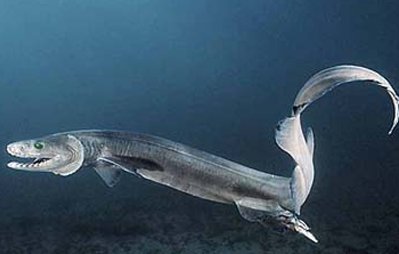Frilled Shark
Category: Shark

Facts about Frilled Shark, "Scientific name for Frilled Shark is Chlamydoselachus anguineus". The Frilled Shark species also known as living fossil is one of the rarest sharks primarily because of the depths in which it lives. It has around 300 triangular shaped and needle like teeth. Though they look scary, the Frilled Sharks are not dangerous to humans because they mostly feed on sea animals that are located in the same depth in which they live. The Frilled Shark belong to the genus Chlamydoselachus and that is where they derive their scientific name Chlamydoselachus anguineus.
Physical Appearance of Frilled Shark
Frill sharks have an eel like appearance and have big mouths. Instead of having an end beneath the skull, the mouth extends beyond the rear of its head. They have an area that has 6 frilled gills near the throat. The Frilled Shark also have fins which include the anal, dorsal, pectoral and a prolonged caudal fin. Although no one has seen them attacking their prey, they are assumed to have the same tact as that of an eel. Their bodies are generally slender in shape.
Feeding Behavior of Frilled Shark
The long jaws that characterize the dental formula of the Frilled sharks enable them to swallow their prey whole. The configuration of the jaws does not allow the Frilled Sharks to chew unlike other breeds of sharks. Many of the sharks captured barely have any content in their stomach which means that they either digest very fast or take long before feeding on their next prey. The Frilled Shark eat cephalopods, smaller sharks, bony fishes and other sea creatures.
Breeding of Frilled Shark
Their gestation period can last up to 78 months which is approximately three and a half years. Their litters ordinarily consist of around 6 pups but many of these do not live to their adulthood. This affects the population of the Frilled Sharks.
Habitat and Geographical Distribution of Frilled Shark
Mostly found in Australia, South East Asia, Chile, West Africa and the Caribbean, frilled sharks live in deep waters. Until recently, the Frilled Shark were considered prehistoric because no equipment would go below 4,000 where they reside. Development and technology however has made it possible for a comprehensive study of the frill shark to be done.
"Scientific name for Shark Selachimorpha"
"Fear of Sharks Selachophobia"

 Back To Category Shark
Back To Category Shark